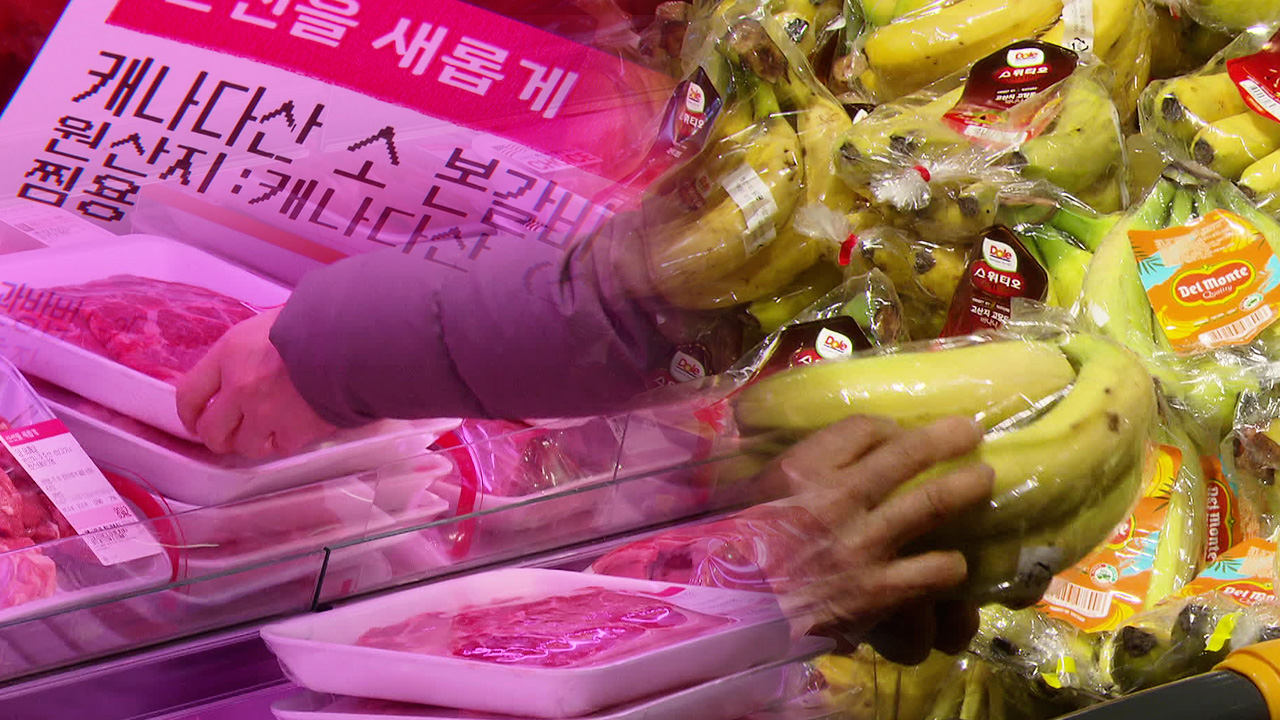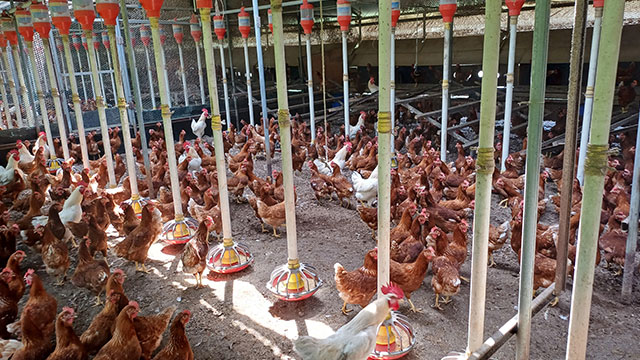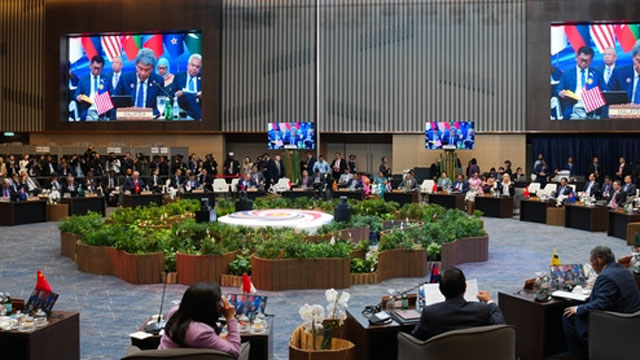[Anchor]
These days, when you go to the supermarket, you can see Vietnamese bananas, Chilean salmon, and Canadian beef instead of the Philippine bananas, Norwegian salmon, and American beef that we're used to.
This is because retailers are diversifying the countries of origin for fresh produce in response to high exchange rates.
Reporter Jo Eun-ae has the story.
[Report]
The imported beef on display are from Canada.
They are priced about 10% cheaper than American beef.
This supermarket imported 90 tons of Canadian beef last December, and over 70% of it was sold in just a month and a half.
The import volume of American beef, which has recently seen a price increase, has decreased by about 20%.
[Moon Seong-mo/Lotte Mart Livestock Team Leader: "In the past 2-3 years, we have faced many difficulties due to rising prices in the country of origin and the impact of high exchange rates. Therefore, we have attempted to diversify the countries of origin to respond to high prices and high costs."]
In the seafood section, Chilean fresh salmon has taken its place.
Priced lower than Norwegian salmon, the sales share of Chilean salmon has increased to 30% in just one year.
[Sun Byeong-cheol/Seocho-gu, Seoul: "(When purchasing,) I pay a lot of attention to the country of origin, and something is a bit different today. The origin is not from Norway but from somewhere else. But the price seems reasonable."]
Vietnamese bananas are priced at less than 2,000 won per bunch.
They are more than 30% cheaper than the previously sold Ecuadorian bananas.
Prices have been lowered by expanding banana import sources to include Vietnam, in addition to the Philippines and Ecuador, and purchasing in bulk.
About 40 tons are supplied to stores nationwide each week, but they sell out by the afternoon everyday.
[Koo Ja-young/Emart Imported Fruit Team: "We are experiencing sellouts around 2 to 3 PM or by 4 PM. They are selling out earlier than expected, which has surprised us."]
It is the strategy of the distribution industry to maintain price competitiveness even if high exchange rates persist by diversifying the countries of origin.
This is KBS News, Jo Eun-ae.
These days, when you go to the supermarket, you can see Vietnamese bananas, Chilean salmon, and Canadian beef instead of the Philippine bananas, Norwegian salmon, and American beef that we're used to.
This is because retailers are diversifying the countries of origin for fresh produce in response to high exchange rates.
Reporter Jo Eun-ae has the story.
[Report]
The imported beef on display are from Canada.
They are priced about 10% cheaper than American beef.
This supermarket imported 90 tons of Canadian beef last December, and over 70% of it was sold in just a month and a half.
The import volume of American beef, which has recently seen a price increase, has decreased by about 20%.
[Moon Seong-mo/Lotte Mart Livestock Team Leader: "In the past 2-3 years, we have faced many difficulties due to rising prices in the country of origin and the impact of high exchange rates. Therefore, we have attempted to diversify the countries of origin to respond to high prices and high costs."]
In the seafood section, Chilean fresh salmon has taken its place.
Priced lower than Norwegian salmon, the sales share of Chilean salmon has increased to 30% in just one year.
[Sun Byeong-cheol/Seocho-gu, Seoul: "(When purchasing,) I pay a lot of attention to the country of origin, and something is a bit different today. The origin is not from Norway but from somewhere else. But the price seems reasonable."]
Vietnamese bananas are priced at less than 2,000 won per bunch.
They are more than 30% cheaper than the previously sold Ecuadorian bananas.
Prices have been lowered by expanding banana import sources to include Vietnam, in addition to the Philippines and Ecuador, and purchasing in bulk.
About 40 tons are supplied to stores nationwide each week, but they sell out by the afternoon everyday.
[Koo Ja-young/Emart Imported Fruit Team: "We are experiencing sellouts around 2 to 3 PM or by 4 PM. They are selling out earlier than expected, which has surprised us."]
It is the strategy of the distribution industry to maintain price competitiveness even if high exchange rates persist by diversifying the countries of origin.
This is KBS News, Jo Eun-ae.
■ 제보하기
▷ 카카오톡 : 'KBS제보' 검색, 채널 추가
▷ 전화 : 02-781-1234, 4444
▷ 이메일 : kbs1234@kbs.co.kr
▷ 유튜브, 네이버, 카카오에서도 KBS뉴스를 구독해주세요!
- Diversifying countries of origin
-
- 입력 2025-02-09 01:08:25

[Anchor]
These days, when you go to the supermarket, you can see Vietnamese bananas, Chilean salmon, and Canadian beef instead of the Philippine bananas, Norwegian salmon, and American beef that we're used to.
This is because retailers are diversifying the countries of origin for fresh produce in response to high exchange rates.
Reporter Jo Eun-ae has the story.
[Report]
The imported beef on display are from Canada.
They are priced about 10% cheaper than American beef.
This supermarket imported 90 tons of Canadian beef last December, and over 70% of it was sold in just a month and a half.
The import volume of American beef, which has recently seen a price increase, has decreased by about 20%.
[Moon Seong-mo/Lotte Mart Livestock Team Leader: "In the past 2-3 years, we have faced many difficulties due to rising prices in the country of origin and the impact of high exchange rates. Therefore, we have attempted to diversify the countries of origin to respond to high prices and high costs."]
In the seafood section, Chilean fresh salmon has taken its place.
Priced lower than Norwegian salmon, the sales share of Chilean salmon has increased to 30% in just one year.
[Sun Byeong-cheol/Seocho-gu, Seoul: "(When purchasing,) I pay a lot of attention to the country of origin, and something is a bit different today. The origin is not from Norway but from somewhere else. But the price seems reasonable."]
Vietnamese bananas are priced at less than 2,000 won per bunch.
They are more than 30% cheaper than the previously sold Ecuadorian bananas.
Prices have been lowered by expanding banana import sources to include Vietnam, in addition to the Philippines and Ecuador, and purchasing in bulk.
About 40 tons are supplied to stores nationwide each week, but they sell out by the afternoon everyday.
[Koo Ja-young/Emart Imported Fruit Team: "We are experiencing sellouts around 2 to 3 PM or by 4 PM. They are selling out earlier than expected, which has surprised us."]
It is the strategy of the distribution industry to maintain price competitiveness even if high exchange rates persist by diversifying the countries of origin.
This is KBS News, Jo Eun-ae.
These days, when you go to the supermarket, you can see Vietnamese bananas, Chilean salmon, and Canadian beef instead of the Philippine bananas, Norwegian salmon, and American beef that we're used to.
This is because retailers are diversifying the countries of origin for fresh produce in response to high exchange rates.
Reporter Jo Eun-ae has the story.
[Report]
The imported beef on display are from Canada.
They are priced about 10% cheaper than American beef.
This supermarket imported 90 tons of Canadian beef last December, and over 70% of it was sold in just a month and a half.
The import volume of American beef, which has recently seen a price increase, has decreased by about 20%.
[Moon Seong-mo/Lotte Mart Livestock Team Leader: "In the past 2-3 years, we have faced many difficulties due to rising prices in the country of origin and the impact of high exchange rates. Therefore, we have attempted to diversify the countries of origin to respond to high prices and high costs."]
In the seafood section, Chilean fresh salmon has taken its place.
Priced lower than Norwegian salmon, the sales share of Chilean salmon has increased to 30% in just one year.
[Sun Byeong-cheol/Seocho-gu, Seoul: "(When purchasing,) I pay a lot of attention to the country of origin, and something is a bit different today. The origin is not from Norway but from somewhere else. But the price seems reasonable."]
Vietnamese bananas are priced at less than 2,000 won per bunch.
They are more than 30% cheaper than the previously sold Ecuadorian bananas.
Prices have been lowered by expanding banana import sources to include Vietnam, in addition to the Philippines and Ecuador, and purchasing in bulk.
About 40 tons are supplied to stores nationwide each week, but they sell out by the afternoon everyday.
[Koo Ja-young/Emart Imported Fruit Team: "We are experiencing sellouts around 2 to 3 PM or by 4 PM. They are selling out earlier than expected, which has surprised us."]
It is the strategy of the distribution industry to maintain price competitiveness even if high exchange rates persist by diversifying the countries of origin.
This is KBS News, Jo Eun-ae.
이 기사가 좋으셨다면
-
좋아요
0
-
응원해요
0
-
후속 원해요
0
















이 기사에 대한 의견을 남겨주세요.